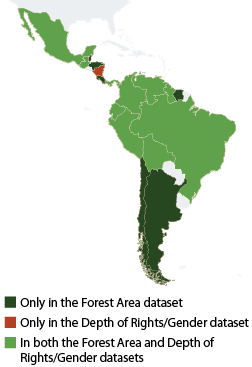Explore data from Latin America.
RRI’s Forest Tenure data tracks forest area via 4 tenure categories, which are based on the rightsholder and strength of their rights under national law. This employs a bundle of rights approach that links RRI’s qualitative and quantitative data. The database also tracks the statutory distribution of Forest Tenure from 2002 to 2017.
Use the key below to see which data is available for each of the 17 examined countries in Latin America.

Key Findings About Women’s Rights to Community Forests in Latin America
Compared to other regions, as of 2024, CBTRs in Latin America exhibit the smallest proportion of adequate protection for the rights of Indigenous, Afro-descendant, and local community women. However, Latin America is the only region to see no legislative rollbacks in the recognition of community women’s forest rights from 2016 to 2024.
It also hosts the largest proportion of community-owned CBTRs, has the greatest recognition of the overarching intestate inheritance rights of daughters, wives, and women in consensual unions, and features the largest proportion of recognized Free, Prior and Informed Consent (FPIC) rights for Indigenous Peoples, Afro-descendant Peoples, and local communities. Yet Latin America provides the smallest proportion of adequate and women-specific protections for women’s leadership rights.
RRI’s Depth of Rights analysis assesses the status and strength of Indigenous Peoples’, Afro-Descendant Peoples’, and local communities’ statutory forest tenure rights across 11 countries in Latin America.
The legal frameworks assessed, called community-based tenure regimes (CBTRs), are defined as distinguishable sets of national, state-issued laws and regulations governing “all situations under which the right to own or manage terrestrial natural resources is held at the community level.”
- 2016
- 2024
Sources: RRI. 2016. Depth of Rigths Database.
Sources: RRI. 2024. Depth of Rigths Database.
RRI assesses two contextual indicators that provide nuance regarding the rights included in the bundle of rights: 1) Free, Prior and Informed Consent (FPIC), and 2) the right to use resources or areas for cultural and/or religious purposes.
Sources: RRI. 2024. Depth of Rights Database.
Sources: RRI. 2024. Depth of Rights Database.
RRI’s Gender Database builds on the Bundle of Rights to assess the extent to which legal frameworks, or CBTRs, recognize Indigenous and local community women’s specific rights to community forests, and whether those states are meeting their obligations under national and international laws.
Learn more about RRI’s Gender Methodology.
- 2016
- 2024
Explore country-level data on the distribution of Forest Tenure over time in Mha. Click on the country name to learn more about the legal frameworks recognizing community-based tenure, including the rights of Indigenous, Afro-descendant, and community women.
Country
Government Administered
2002 2017Designated for Indigenous Peoples, Afro-descendant Peoples, and Local Communities
2002 2017Owned by Indigenous Peoples, Afro-descendant Peoples, and Local Communities
2002 2017Privately Owned by Individuals and Firms
2002 2017Highlighting in gray indicates Complete Case Countries.
Dashes (-) denote situations in which the tenure category in question is not legally possible under national law.
n.d. = No Data
Source: RRI. 2018. At a Crossroads: Trends in Recognition of Community-Based Forest Tenure from 2002-2017.




